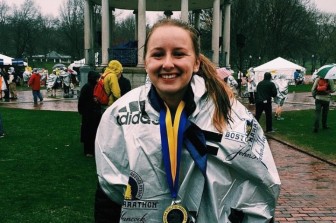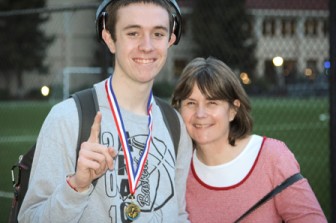
Alumnus Cristina Ashbaugh runs Boston Marathon
Written by Regina Wen

With steady rain, nippy winter breezes, and temperatures reaching a low of 40 degrees, thousands of people flocked to Hopkinton, Massachusetts, dressed in shorts, running singlets, and large, black numbers pinned neatly to the front of their shirts. Among them, Aragon alumnus Cristina Ashbaugh, after four and a half months of training, embarked on her four-hour trek to complete the 2015 Boston Marathon on Monday, April 20.
Ashbaugh, a freshman at Emerson College in Boston, says, “I had the support of everyone in Boston. Having everyone in the city cheer for you was amazing.”
The Boston Marathon, the annual race across eight Massachusetts cities, is a long-running Boston tradition. The Boston Athletic Association, the organization that put on the event, has 30 registered charities that teams raise money and run for.
Ashbaugh says, “My team ran for Brigham and Women’s Hospital in Boston. They’re the hospital that treated a lot of the bombing victims two years ago. We had like 60 people on the team. I raised $8,000, but people raised anywhere from $5,000 to $10,000.”
For Ashbaugh, running a marathon was not an immediate goal she had when moving away to college. “My coach for cross country at Emerson is a marathon trainer, so he kind of encouraged me. He was like, ‘Have you ever thought about doing Boston?’ And I was like, ‘Well, no. I’ve never really thought about doing a marathon.’ He was like, ‘You should really think about doing it. You can run for my team, and it’ll be awesome.’”
She continues, “I [had] only ever run a half [marathon] before. I thought that since I can do half the maybe I could try do a full marathon. But I definitely didn’t think I could do it right off the bat.”
Ashbaugh trained with her team from December all the way up to the day of the marathon. “We would meet every Saturday at the same place at 8 a.m., and we would go on our long runs, and our coach would be there to give us advice. During the week I would pretty much do my normal training, just without a lot of the speed work. The Saturday long runs were something I’ve never done before. Just getting up to 21 miles was different. I mean I’ve done 18 miles a few times and 16 miles a few times but getting up to that 21 miles was just so different,” she says.
Ashbaugh was also pushed to her limits as an athlete. “You never actually run the full 26 miles before the marathon, so you have to leave those last 5 miles up to your endurance and training,” she says.
In the weeks leading up to the marathon, Ashbaugh’s psychological fortitude was put to the test when her physical therapist put her on crutches for hip tendonitis. Ashbaugh says, “It hurt to walk. I had a few mental breakdowns there. I thought, ‘Oh my gosh, I have to run this marathon next week, and I’ve trained so hard for it.’ I was just so down.”
Yet Ashbaugh was determined to finish the marathon. On April 20, after a week on crutches, Ashbaugh geared up to run one of the largest marathons in the US.
She says, “On the day of the marathon, I actually woke up at 6 a.m. even though I didn’t have to because my boss left at 8:45. I actually felt like I was going to throw up.”
26.2 miles later, Ashbaugh completed the Boston Marathon in 4 hours and 32 minutes.
Ashbaugh says, “I was on pace at 13 miles, the half-point, which was my goal. Then, at mile 16, kind of where the hill starts, I dropped off and my legs just started dying.When I crossed the finish line, I just wanted to kind of collapse and lie down.”
While the race may have been tough, for Ashbaugh, crossing the finish line was euphoric. Ashbaugh reflects, “ the first thing I heard was my friends who had also run and had already crossed the finish line. They were calling my name. It was really exciting. It was really nice to see people I knew after running for four hours just by myself.”
She concludes, “Even though the weather was pretty bad and I was really cold, running the marathon was amazing. Crowds were still out there even though it was so cold and rainy. The spirit was so high. There was no way I could’ve finished without the spirit and the energy of the fans and everyone coming out to support us.”
———————————-
Alumnus Kevin Hahn follows path to recovery post-surgery
Written by Charles Cao

Walking into the locker room just 50 minutes prior to the 4 p.m. start time, Kevin Hahn proceeds with his typical pre-game routine, buttoning up his jersey and pulling up his socks before tying his cleats and walking onto the baseball field. Just two hours beforehand, Hahn was in the hospital receiving fluids through a needle into his left arm—his non-pitching arm. “There was no way I was going to miss my final start against Hillsdale, our rival,” said Hahn in an interview with Daily Journal staffer Nathan Mollat.
In the end, Hahn was able to take the mound, throwing six innings against his rival Knights—allowing three runs on five hits with six strikeouts in the eventual 7-3 Aragon victory.
To a freshman, the name Kevin Hahn may only evoke an ambivalent expression and a confused “who?” To others familiar with his athletic career while at Aragon, Hahn is commonly recognized for his athletic prowess. However, no matter the response, Hahn’s athletic resume speaks for itself.
A class of 2014 alumnus and Athlete of the Year recipient, Hahn excelled on both the varsity basketball and baseball teams, earning All-League honors in both sports and winning the San Mateo Daily Journal Athlete of the Year Award.
However, what made Hahn’s athletic performance more remarkable was the fact that he was also dealing with Ulcerative colitis, a chronic, autoimmune disease which affects the colon. Pain remains a hallmark of Ulcerative colitis, as ulcers form in the inflammed colon.
“I think [sports are] what got him through. He’s a true athlete. School is school, but he lives for sports. The best analogy would be when the baseball team lost in [May], the next day his body fell apart. Mentally, he just wouldn’t let himself be as sick as he probably was,” said his mother, Dawn Hahn, in an interview with UCSF Benioff Children’s Hospital.
On the basketball court, the 6-3 guard-forward combo served as an integral starter on the Dons’ Central Coast Section (CCS) Division III championship team. On top of his 13.2 points per game, Hahn led the teams in three-pointers made with 58 total three-point field goals from beyond the arc.
On the baseball field, Hahn was one of the league’s best pitchers and the team’s strongest infielders. Hahn batted .310 in 18 games and posted a 1.75 ERA, including a 5-to-1 strikeout-to-walk ratio in his senior year—all en route to his team MVP recognition.
At the age of 12, Hahn was diagnosed with ulcerative colitis, which oftentimes sapped him of his strength and energy while giving him excruciating pain. Due to this, Hahn’s immune system would commonly mistake his food for foreign and invading substances, therefore sending white blood cells into his intestines to fight off the perceived intruders. Through he was able to receive medical treatment in previous years, his conditions worsened around the CCS playoffs in his senior year, during which his symptoms suddenly began to worsen. The pain in his stomach would frequently become too unbearable to the point where he would not be able to move for long periods of time.
As the year went by, Hahn’s health continued to deteriorate. Many of his basketball and baseball games were preceded by hospital visits and pain medication. Even in the offseason, Hahn was constantly in and out of the hospital to fix his ailments—and at one point he stayed for 31 consecutive.
Between April and May alone, he was hospitalized three times, during which he lost approximately 20 pounds and experienced diarrhea and stomach pain. He went directly from the hospital to the field twice in the season to receive treatment prior to his athletic contests. In the winter, Hahn would resort to taking two pain pills before every basketball game in order to suppress the discomfort.
Ultimately, Hahn and his gastroenterologist, Dr. Melvin Heymen, elected to undergo surgery to remove his colon in June. In addition to the operation, his small intestine was pulled down and put in a temporary bag.
Throughout it all, sports was always the relief for Hahn no matter how bad his health would get. “Sports was always a must for me because it gave me a chance escape all the issues and medical problems,” Hahn said. “I got to just do the things that made me the happiest, and for the most part of those one to two hour games, I did not have to worry about my stomach because I was focused on the game. It was a great escape.”
It helped that Hahn had a loving and supporting mother, who would frequently visit him at the University of Arizona and accompany him to the hospital. “She is one of the main reasons I was able to get through what I did,” he says. “Every hospital stay I had no matter how long, she never left my side. I’m extremely grateful and thankful because I would not have been able to get through this experience without her.”
These days Hahn’s health is thankfully gradually improving. “My health right now is doing really well,” he says. Hahn was forced to take off his first year off from college in order to recover from the complications. Nonetheless, Hahn continues to not let his health issues inhibit his athletic pursuits. Next year, he plans on attending De Anza College and playing baseball for the school team.
“He’s been through a lot. He’s doing much better. He has no pain, which is a blessing. It was a very emotional holiday season. We were all very thankful that he’s better. He’s gone through so much and handled it amazingly,” says Dawn Hahn.
Written by Charles Cao.

